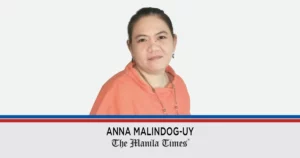AMID an ongoing verbal sparring match between Beijing and Manila spanning several months, it appears that China has grown irritated by the persistent denials from Philippine government officials regarding the purported “new model” agreement for resupply missions to Philippine troops stationed in the disputed Second Thomas Shoal in the South China Sea. This prompted China to adopt a hardball diplomatic stance, exemplified by the release of a transcript capturing the discussions between a Chinese diplomat and Vice Admiral Alberto Carlos, the head of the Philippine military’s Western Command, regarding the so-called new model or “one-plus-one” agreement with an overarching aim of mitigating and de-escalating tensions in the area, which, in my view, represents a prudent step for both parties to prevent escalation and promote diplomatic stability.
Ensuring smooth resupply missions, free from confrontations, is crucial for regional peace, stability and security. Why then would the Marcos administration deny this? The intention behind this new model agreement is genuinely beneficial for both sides. Could it be that the Americans are unhappy with it?
Controversy
The controversy stirred by the release of the transcript underscores a deeper narrative. China appears intent on asserting the existence of an agreed-upon “new model” agreement between the two nations, emphasizing the Philippines’ alleged breaches.
The transcript documenting a purported conversation on Jan. 3, 2024, implies that Vice Admiral Carlos acquiesced to the so-called new model for managing resupply missions to the disputed Second Thomas Shoal where the BRP Sierra Madre is situated. In the transcript, Carlos indicated to the Chinese diplomat that the proposed “new model” had received approval from higher authorities, including a name redacted in the document, AFP Chief General Brawner, Defense Secretary Gibo Teodoro and National Security Adviser Secretary/General Año.
Consequently, on Feb. 2, 2024, AFP spokesman Col. Francel Margareth A. Padilla announced the flawless execution of a rotation and resupply operation for BRP Sierra Madre on her official Facebook account, highlighting teamwork, precision and dedication. However, the post was deleted following the release of the transcript. The optimism from the successful operation was short-lived as tensions surged again between the Philippines and China. This resurgence precipitated diplomatic and political crises, further straining bilateral relations, particularly concerning the South China Sea dispute.
Philippine authorities have vehemently denied there is such a “new model” agreement, dismissing the transcript as a fabricated deception possibly generated by AI. This controversy has escalated with accusations of violations of Philippine laws, such as the Anti-Wiretapping Law. The tensions have reached a point where high-ranking Philippine officials are advocating for the expulsion of implicated Chinese Embassy officials, citing their alleged involvement in malign influence and interference operations within the country.
Hindsight
Amid the controversy surrounding the Chinese side’s release of the purported transcript, the response from the Philippine government officials concerned appears disjointed. Their reactions, marked by swift denials, seem to betray a certain level of anxiety. This inconsistency is particularly perplexing. The accusation against China engaging in wiretapping implies the acknowledgment of the existence of an audio recording and the authenticity of the transcript. Conversely, other Philippine government officials, including the AFP, assert that the transcript is “deeply fake.” These conflicting statements only further complicate this issue.
Speaking of wiretapping, Sen. Francis Tolentino has filed a resolution to investigate an alleged wiretapping incident involving the Chinese Embassy in Manila related to the “new model agreement” negotiations between the Philippines and China. Accordingly, the Chinese Embassy will be invited to a Senate hearing on Tuesday (May 21). It is crucial to consider whether it is prudent and lawful under international law to subject Chinese Embassy officials to this hearing. I also think this matter raises complex questions under international law.
Under the Vienna Convention on Diplomatic Relations (1961), diplomats enjoy immunity from the jurisdiction of the host country’s courts and other authorities. This immunity is intended to allow diplomats to perform their duties without fear of coercion or harassment by the host country. Article 31 of the Convention specifically provides immunity from the host state’s criminal, civil and administrative jurisdiction. This means they cannot be prosecuted or sued under the host country’s laws. This immunity extends to the diplomats’ personal immunity and family members. Note also that the premises of a diplomatic mission, such as an embassy, are inviolable. Host country officials cannot enter the premises without permission, and the mission’s property and archives are protected. These principles are outlined in the Convention, which provides the legal framework for diplomatic relations and the treatment of diplomatic missions.
Note that the principle of sovereign immunity also protects foreign states and their representatives from being subjected to the legal processes of another state. Inviting Chinese Embassy officials to testify in a Senate hearing could be seen and perceived as a violation of this principle, potentially leading to severe diplomatic and political tensions in the already tension-driven diplomatic and political relations between the Philippines and China. The potential consequences of this action cannot be overstated. In my opinion, the issue could be addressed through diplomatic channels instead of summoning diplomats to a public hearing. This approach respects the principles of diplomatic immunity and protocols, and avoids escalating tensions.
Hence, attempting to accuse the Chinese side of violating anti-wiretapping laws or interfering in the Philippines’ internal affairs is futile. Keeping transcripts and recordings is common practice, particularly during high-level diplomatic discussions between governments on sensitive issues. These records serve multiple purposes, such as historical documentation, ensuring accountability and transparency, and facilitating decision-making for both parties.
Moreover, a deeper examination of Vice Admiral Carlos’ role is crucial. The transcript reveals that Carlos acted more as an intermediary than a decisive authority. It appears he became the scapegoat for the government officials mentioned in the transcript, who are responsible and should be held accountable for shedding light on this matter by providing an honest, straightforward and accurate explanation. This whole fiasco undermines Vice Admiral Carlos’ reputation and integrity as a military officer and highlights broader issues of accountability and transparency within the current government. It appears unjust and unfair that seemingly Carlos has been made the sacrificial lamb to shield others from scrutiny in this controversy. It is indeed crucial for the Filipino people to recognize the implications of such actions and strive for greater transparency, accountability and fairness in addressing these controversial matters.
Conclusion
To effectively address this dispute between the conflicting parties, it would be wise for the relevant Philippine government officials to abstain from making provocative remarks and instead return to the negotiating table to engage in constructive dialogue with their Chinese counterparts. Prioritizing diplomacy remains the most prudent approach for both sides to pursue a resolution to this controversy.
Furthermore, one must not forget that trust, good reputation and honoring agreements, big or small, are the bedrock and foundational principles of international relations. They play a pivotal role in maintaining stability, fostering cooperation and resolving disputes. When trust is nurtured and upheld, it serves as a cornerstone for building stronger and more resilient international partnerships.
Source: The Manila Times
https://www.manilatimes.net/2024/05/18/opinion/columns/controversial-transcript-of-purported-new-model-agreement-between-ph-and-china/1947197


